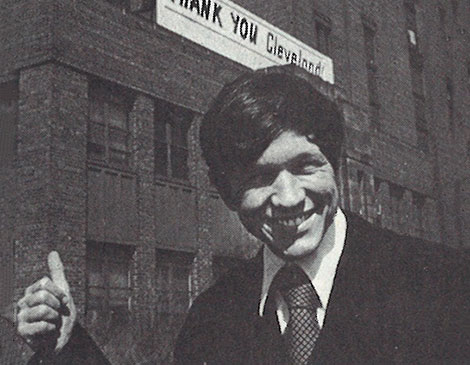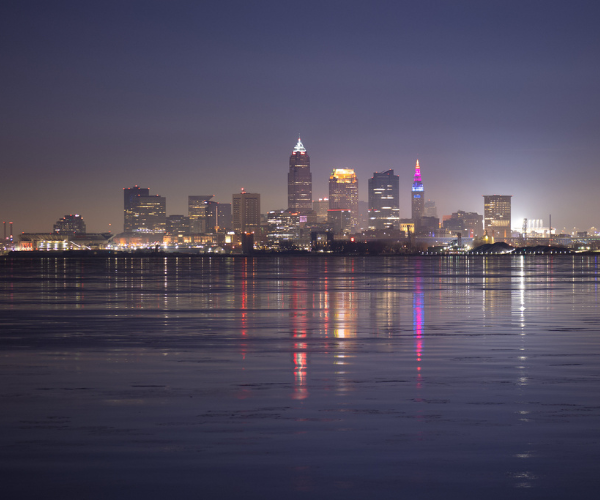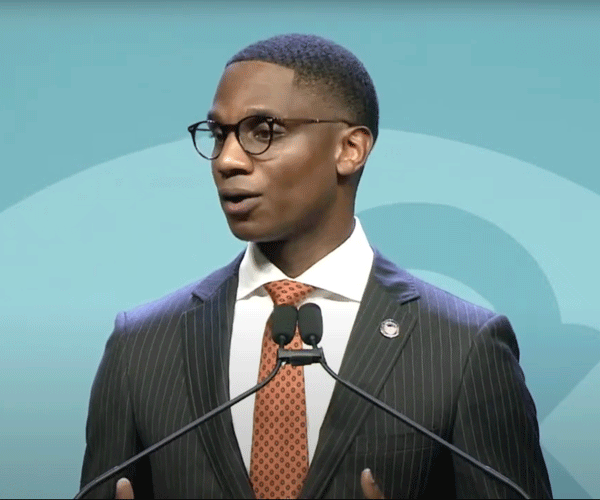One of the minor crosses I bear (and a strange and unsettling burden it is) is that I am known among certain people in town, some of them friends, as a man who does not hate Dennis Kucinich enough.
Most people are very nice about this. My friends, even some in the media, exercising their professional judgment of Dennis and his tactics, express feelings of outrage, disgust and dismay which never vary. Like the pole star, theirs is a revulsion you can steer by. My friends, sensing that I lack such direction-finding equipment, worry about me. They fear I will go on the rocks and flounder and get my cargo of adjectives all wet.
Last month I became aware that the feeling that I do not hate Dennis Kucinich enough was not confined to a few caring friends but had spread to a group of interested and concerned strangers.
I had been asked to appear on NBC’s Tomorrow show to talk about the state of the city and the state of the Kucinich administration. I had scarcely received the invitation when the phone rang and it was Herb Kamm, friend, press columnist and noted Kucinich critic. Kamm already knew about the invitation, for it seems that the City Club, in which he is active, had been pressuring the Tomorrow people to put somebody on the show who would testify about the evils of the Kucinich administration — an attempt to counteract some shows on which Kucinich had appeared masquerading as a good guy.
Kamm, whose column scoops have placed him high on Kucinich’s enemies list, told me that the City Club people were upset that I was going to appear on the program. They felt, he indicated, that I was not a suitable choice, partially because I didn’t understand (perhaps wasn’t smart enough to understand) the evil that Kucinich was visiting upon the city. And possibly because I didn’t hate Kucinich enough, went the City Club reasoning.
Kamm indicated that he had put in a good word for me and had urged City Club members to reserve their judgment until after the show. They would all be waiting up late to watch me, he said (the way a decent householder waits up to foil a burglary, I presume) and he, for one, was sure I would come through with flying colors. Then he said goodbye and left me to think about things.
Thinking about things was gloomy work. It seemed to me that I was in a no-win situation. I had, after all, been a reporter in the ’60s and so I had learned a lot about polarized thinking and what happened when such thinking takes over a place like, let us say, Cleveland. Polarized thinking allows for no middle ground. You are either on one side or on the other side and, what is worse, the sides are at opposite ends of the room, backs pressed against the wall. The hotter the fight, the larger the area of no-man’s land. Wander around in the middle and you draw fire from both sides.
No-man’s land was precisely where I was and I was defenseless in it. I began re-evaluating my position. Perhaps, I thought, my friends and the militant strangers were right. Perhaps I was suffering from a deficiency of hatred.
I have, after all, nothing against hatred. There are times when hatred is a handy emotion. I can imagine hating the Nazis had I been forced to live under their subjugation in France. Or hating the Ku Klux Klan were I a black man. Hatred under those conditions seemed a useful and worthwhile activity. But transferring that emotion to Dennis seemed illogical. And the reason it seemed illogical was that Dennis was elected. Not just once but, in a sense, three times. He was elected in an election. He was re-elected after an attempt to recall him. And finally, the margin by which the city income tax issue and the Muny Light plant issue passed was, while not a third election of Dennis, certainly an expression of support for him.
Three times in fifteen months, the voters of Cleveland had affirmed their desire to have Dennis lead them. They had done this in the face of strong media and establishment objection. More than any other mayor, Dennis had proven that the electorate wanted him.
And so, it seemed to me, that if evil was afoot in the city, the place to look for its wellspring was among the voters of the city.
But, having been raised among the mass media and having been taught their ways, I knew that no mass-media preacher would ever look for evil among the masses. This would be biting the hand that feeds. It is a cardinal principle among editorial writers and columnists that they never give their readers hell. If you think about it for a moment, that’s absurd. There are plenty of times when, confronted by some manifestation of apparent ignorance on the part of the electorate, the most truthful thing an editorial writer could do would be to ask, “What the hell is the matter with you people out there? Have you got oatmeal for brains?”
But this is never done. And so, in the face of three strong indications that the people of Cleveland wanted Kucinich, the media got sore not at the people of Cleveland but at Kucinich, for being so want-able.
A couple of days after Kamm called me, I had lunch with the mayor. I had invited him to lunch, but he indignantly refused to let me pay when he found out I intended to put the lunch on an expense account. That attitude made ensuing conversation easier. I told the mayor that I had been taking some flak for not hating him enough. He responded in a sympathetically humorous fashion. Then I told him that, while not hating him enough, I didn’t approve of him much. I didn’t approve of the way he went out of his way to antagonize the business community. I didn’t approve of his lack of statesmanship. Statesmanship, I thought, was a quality quite necessary in a mayor.
The mayor listened and then told me that the business community should be treated no better than the average citizen and that if I thought it should I was wrong. He said that the people of the city are frustrated and added that so are a great multitude of the middle-class people in the suburbs. He thought that his brand of politics would be attractive to such suburbanites — a sort of suburban populism.
He had, in an office at City Hall, volume after volume of carefully filed letters. Letters from people all over the country who were frustrated, angered and dissatisfied. These people, he said, had written to him to encourage him to continue fighting those forces they perceived as the cause of their frustration and dissatisfaction. These letters meant something, he said, and he left me thinking that some day soon he would test his political clout in a wider election — an election in which frustrated and angered middle-class people would support him.
After I got back to the office it occurred to me that I had missed the boat at lunch. It occurred to me that perhaps the thing I most disapprove of in Dennis Kucinich is that he lacks a vision of the way things should be. An idealistic vision. Unlike Martin Luther King, he has, so far as I can determine, no dream. Dreams, perhaps, but no dream.
And the disturbing thing is that he is able to function — to succeed — without one. For Cleveland, bitter as it is to admit it, may be a city beyond dreaming. A great dying city in a nation full of great dying cities inhabited now mostly by voters whose pressing problems of poverty and fixed-income bitterness are too immediate to permit the luxury of a dream. Voters whose weariness and crankiness make them champion a hero who, like the shark, lives only to attack and must attack to live.
How useless it is then to hate Kucinich. It is the quality of life without a dream that is the hateful thing — hateful at first and then, finally, empty of any feeling at all. Empty as a street full of condemned housing where the sound of the wind is really the sound of a final silence.
This story originally appeared in Cleveland Magazine's May 1979 issue.




